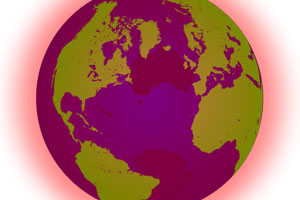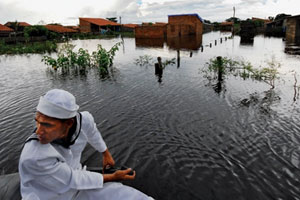
Illustration: Hal Mayforth
Also from the Climate Desk: A look at domestic legal strategies to address global warming.
The Pruné?ov power station is the Czech Republic’s biggest polluter: Its 900-foot-high smokestack pushes a plume of white smoke high above the flat, featureless fields of northern Bohemia.* Pruné?ov reliably wins a place on lists of Europe’s dirtiest power plants, emitting 11.1 million tons of carbon dioxide each year. So when CEZ Group, the state-controlled utility, proposed an overhaul to extend the facility’s life for another quarter of a century, protests flared—including one from a place about as far from the sooty industrial region as you can get, a place of tropical temperatures and turquoise seas with not a smokestack in sight. This January, the Federated States of Micronesia, some 8,000 miles away in the Pacific Ocean, lodged a legal challenge to the Pruné?ov plant on the grounds that its chronic pollution threatens the island nation’s existence.

A groundbreaking transnational legal action might sound like a tall order for a country of 107,000 people whose most high-profile endeavor to date has been hosting the 16th season of Survivor. Yet Micronesia has incentives to get innovative. NASA satellite maps show that the nation inhabits the spot where sea levels are rising most rapidly. For the past three years, abnormally high tides have assailed the islands, souring the soil and salting the aquifer, making it impossible to grow taro, one of the country’s few staple foods. Last year, the government declared a national emergency and spent more than 7 percent of its budget of $42 million to ferry bags of rice and drinking water to its low-lying islands. Professor Charles Fletcher, a geologist from the University of Hawaii who has conducted research in Micronesia, said, “This is the first situation I’m aware of where sea-level rise has led to threats to food and water security.”
Micronesia made its move against the Pruné?ov plant on January 4, when it filed a formal objection under the Czech Republic’s environmental impact assessment law. (Czech law doesn’t limit which nations can participate in this process). In response, the government first postponed its decision on the plant, and then called in an independent Norwegian firm to assess the plant’s carbon output. In March, the government decided to allow the plant to proceed—but the decision was so controversial that the environmental minister quit in protest.
With the world’s top carbon-emitting nations seemingly unable to come up with a binding climate treaty, both environmental lawyers and representatives of small island nations are increasingly looking for other forms of leverage. While Micronesia’s effort did not succeed this time around, environmental lawyers hope it will encourage similar experimentation with legal tools that could be used to pressure big emitters to clean up their act. “If we can take our gaze to an international court, that would be an avenue the government may have to explore,” said Andrew Yatilman, Micronesia’s director of environment and emergency management.
One lawyer thinking along similar lines is Matthew Pawa, one of the lead attorneys on a pioneering lawsuit in which the Inupiat community of Kivalina, Alaska, is suing 19 US oil and utility companies, including BP and ExxonMobil. The case is based in part on a simple nuisance claim—the same common-law principle you might deploy to sue your neighbor if he opened an obnoxiously loud nightclub next door. Kivalina claims that the companies’ carbon emissions are helping to melt the sea ice on which the village sits, which will require it to be relocated at a cost of up to $400 million. That case was dismissed by a California court but is now on appeal; Pawa is seeking overseas clients, too.
Environmental lawyers point to several possibilities for international claims. Countries affected by oceanic changes could seek redress via the Convention on the Law of the Sea, although it can’t be used against the US—which hasn’t ratified the treaty. A nation could go after a polluter in the International Court of Justice on the grounds that its citizens’ human rights would be violated if their country were wiped off the map—but, again, the US is not a signatory, and the ICJ is somewhat toothless. A number of lawyers told me that the most promising avenue might be the common- law doctrine used in the Kivalina case. Any nation could sue a US company in US court for a “nuisance” caused by climate change—Tuvalu v. ExxonMobil, if you will. And a couple of island nations that were once American protectorates, like Micronesia and Palau, have legal compacts with the US that give them more powerful tools: They could potentially sue a company or even a government agency, using domestic statutes such as the Clean Air Act.
Which is not to say that winning will be easy. While the scientific evidence of climate change has hardened to the point of irrefutability, blaming someone for it in a court of law is a knottier business. US judges have swatted down most climate lawsuits either by ruling that global warming is for Congress to address, or by finding that it would be unfair to hold a handful of companies responsible for damage caused by centuries of pollution across the world.
Nevertheless, industries are bracing for a tide of climate lawsuits. The major insurer Swiss Re has warned that “climate change-related litigation could become a significant issue within the next couple of years.” Pawa compares this nascent field to the epic court battles over tobacco and asbestos. “It’s a process of learning by doing,” said Pawa. “Just by bringing these cases over and over again, the judiciary [and] the public get used to the idea of liability.” According to a forthcoming United Nations study, the world’s 3,000 biggest public companies could be on the hook for $2.2 trillion—more than 30 percent of their profits—if they were made to pay for the fallout of their carbon emissions.
In truth, legal challenges don’t even need to reach that point to serve a purpose. “Lawsuits are part of an overall strategy to make the US move,” one lawyer told me. “They could be a chip in some grand bargain for legislation: We’re going to eliminate liability for climate change, but we’re going to get a really good deal on mitigation.”
Hauling global companies to court would be an audacious gamble for tiny nations that rely heavily on foreign aid. “There are huge political risks,” said Stuart Beck, Palau’s ambassador to the UN. But with world leaders already downplaying hopes for a binding treaty at the climate talks in Mexico this November, vulnerable countries are contemplating which is the larger hazard: angering their donors, or waiting patiently until the only aid they require is a bulk purchase of plane tickets. As attorney Pawa puts it, “Countries are literally being driven out of existence—they are going to turn to whatever systems they can. Right now they’re looking to require developed nations to reduce emissions. In the future, I think they’ll be looking for compensation.”
*Correction: This story originally identified the smoke as coming from the cooling towers.
This piece was produced by Mother Jones as part of the Climate Desk collaboration.












